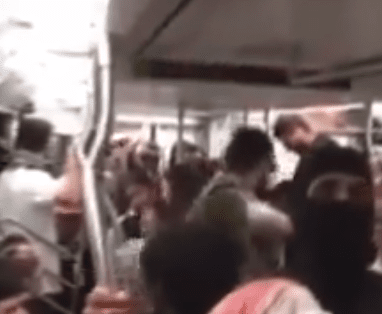|
Getting your Trinity Audio player ready...
|
Restoring NY’s “No Masked Demonstrations” Law: A Necessary Step Against Rising Anti-Semitism
New York State must urgently reinstate its “No masked demonstrations” law to address the escalating threat posed by masked protesters engaging in anti-Semitic activities. The recent surge in masked demonstrations has highlighted the need for decisive action to ensure public safety and uphold community standards.
ON A NYC SUBWAY CAR: “Raise your hands if you’re a Zionist. This is your chance to get out.”
Change the word “Zionist” to “trans, “gay”, “black”,” or “Muslim,” and see what happens.
It’s open season on the Jews.@NYCMayor @NYPDnews @NYPDPC pic.twitter.com/1OFd2QaKYk
— NYScanner (@nyscanner) June 11, 2024
Assemblyman Michael Reilly (R-SI) has been a vocal advocate for reinstating the mask ban. Before the state legislature adjourned for the year, Reilly proposed joining 16 other states in prohibiting “deceptive” masks or face coverings during public demonstrations. However, the Democratic majority in Albany dismissed the proposal, showing a lack of urgency to address a growing problem. This inaction has allowed anti-Semitic elements to exploit the absence of legal restrictions on masking, thereby threatening public order and safety.
The recent rise in masked participation at “pro-Palestine” protests is alarming. Demonstrators wearing keffiyehs and other face coverings are not merely making a fashion statement; they are deliberately concealing their identities to evade accountability. This tactic, reminiscent of the Ku Klux Klan’s use of masks, serves to embolden the protesters and intimidate onlookers. The use of masks creates an environment where individuals feel emboldened to engage in hate speech and other forms of intimidation without fear of identification or reprisal.
The situation has deteriorated significantly, with local protests becoming increasingly hostile and overtly anti-Semitic. Incidents such as the “Zionists need to leave” subway outrage and the shocking display of hatred at the “Long live October 7th” rally, where a protester expressed admiration for Hitler, exemplify the dangerous escalation. These acts of hate speech are not isolated incidents but part of a broader pattern of intimidation that undermines public safety and social cohesion.
Mask bans have a long history in the United States, primarily as a response to the terror tactics of the Ku Klux Klan. These laws were enacted to prevent masked individuals from using anonymity as a shield for their violent and hateful actions. Today, the resurgence of masked protests necessitates a similar response. The parallels between the Klan’s use of masks and the tactics employed by contemporary protesters are striking and warrant serious consideration by lawmakers.
Attorney General Letitia James has a unique opportunity to demonstrate leadership by advocating for the reinstatement of the mask ban. Her previous role in repealing the law during the pandemic was understandable given the public health context. However, the current climate of rising anti-Semitism and masked intimidation demands a reassessment. By championing the revival of the mask ban, James can help protect vulnerable communities and restore a sense of safety and order.
Conclusion
The argument that mask-wearing prevents “doxxing” of activists does not hold up against the primary concern: the right to protest anonymously does not exist, especially when it serves as a cover for bullying, threats, and potential violence. It is imperative for state leaders to take decisive action now.
Governor Kathy Hochul’s response to the growing call for action has been tepid at best. While she has expressed a willingness to “look at” restoring the mask ban, this is insufficient given the urgency of the situation. Governor Hochul needs to join forces with Mayor Eric Adams, who has already voiced strong support for reinstating the anti-mask law. Together, they should demand that the Legislature reconvene for a special session to address this critical issue.
State lawmakers must recognize the importance of restoring the anti-mask law and take swift action. If they fail to do so, they should be held accountable by their constituents. With elections on the horizon, voters have the power to track and remember which politicians stand up against modern-day intimidation and which ones do not. It is essential for the electorate to support candidates who prioritize public safety and the preservation of civil order.




